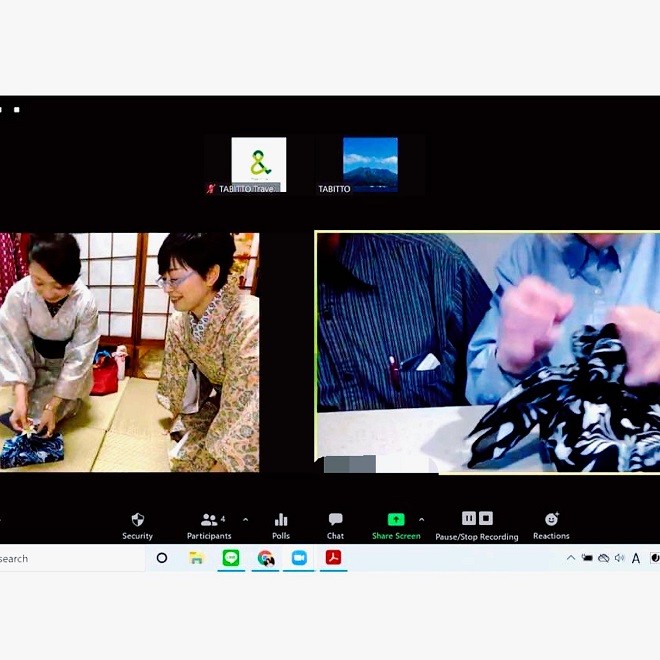“One, two, dong!” shouted a girl in her 60s guiding an internet tour group utilizing digital actuality expertise.
On that sign, three Australian vacationers moved their our bodies in entrance of their computer systems as in the event that they had been putting a temple bell.
It was a part of a trial of an internet tour performed in December that showcased Engyoji temple of the Tendai sect of Buddhism, which in actual life sits on Mount Shosha in Himeji, Hyogo Prefecture.
“The tour was performed on-line nevertheless it didn’t really feel like one-way communication,” mentioned the girl, who works as a nationwide licensed information interpreter.
“I felt that we will do extra attention-grabbing issues” within the on-line tour, she mentioned. “We may do issues collectively, similar to putting the temple bell.”
The Japan Tourism Company commissioned “Kanko information kasseika renkei kyogikai” (The affiliation to cooperate for exciting the tour information business) to conduct the check, one in all a lot of new initiatives aimed toward creating on-line work alternatives for tour information interpreters amid the pandemic, which has dealt a devastating blow to their business.
The affiliation was arrange final 12 months by eight companies and organizations together with the JR-West Group’s West Japan Advertising and marketing Communications Inc. It intends to do comparable trials with 13 digital journeys, together with one to Himeji Fortress, to assist create new on-line tour packages and put information interpreters again to work.
LEFT TO FEND FOR THEMSELVES
Information interpreters have struggled because the onset of the COVID-19 pandemic. As a result of their prospects are overseas vacationers, the revival of home tourism pushed by the federal government’s Go To Journey marketing campaign didn’t profit them.
A 38-year-old man dwelling the northern Kanto area who misplaced his work as a information interpreter now makes his dwelling by working half time at a close-by grocery store.
He doesn’t conceal his anxiousness about his future.
“I want to work once more as a information interpreter as soon as overseas vacationers return,” he mentioned. “Nevertheless, I’m not optimistic, though the surge in infections will relax sometime.”
After graduating from a college in the USA, he handed the examination to grow to be a nationwide licensed information interpreter in 2012 with the hopes of constructing use of his English language abilities.
All through his work life, he was in a position to take round 4,000 overseas guests from nations similar to the USA and Australia yearly to vacationer sizzling spots throughout Japan, together with Mount Fuji.
“The job’s intention is to create a great feeling towards Japan, so it was extremely rewarding,” he mentioned.
However the pandemic modified all the pieces.
The variety of overseas guests, which topped 30 million yearly in pre-COVID-19 instances, plummeted, and his work disappeared.
He utilized for the federal government’s allowance for folks compelled to take depart from work as a result of pandemic. His annual revenue has dropped by nearly half from previous to the worldwide well being disaster, when he earned about 6 million yen ($52,000) a 12 months.
The Go To Journey marketing campaign, which helped quickly revive home tourism, didn’t return him to work.
“Information interpreters are left alone within the tourism business,” he mentioned.
NEW LOBBY EFFORTS
Japan has two principal forms of licensed information interpreters. Nationwide licensed information interpreters are accredited by the federal government after passing an examination to check their data on tourism-related matters, together with Japanese historical past and geography, in addition to their overseas language abilities.
The opposite type, regional licensed information interpreters, have been accredited by prefectures or municipalities for tour information work in particular areas. In accordance with the Japan Nationwide Tourism Group, as of April 2021, there have been round 26,000 guides with nationwide licenses, and about 3,600 regionally licensed ones in 40 areas.
Not lengthy earlier than the pandemic hit, in 2018, the Japanese authorities had began permitting unlicensed guides to begin working to satisfy a rise in overseas guests. However the Japan Tourism Company treats them otherwise than these with accreditation.
In October final 12 months, a number of teams of information interpreters established the “Japan Affiliation of Interpreters and Guides” (Tsudanren), to foyer for support amid the continuing well being disaster. It submitted a request in December to the Japan Tourism Company for elevated monetary support for information interpreters, in addition to help for coaching to enhance their abilities.
In accordance with the group, the pandemic has seemingly value 20 to 30 p.c of information interpreters, primarily youthful ones, their jobs.
“If the federal government is critical about its declaration that it’s going to grow to be a ‘tourism nation,’ information interpreters who can precisely talk Japanese historical past and tradition are important sources,” mentioned Masahiro Sumikawa, Tsudanren chairman. “We want to name for help for them, together with ones that will probably be wanted after the pandemic ends.”
VIRTUAL TOURS A LIFELINE, NOT A FIX
Mikiko Horikiri, 51, who works as a nationwide licensed information interpreter for English-speaking guests in Kagoshima Prefecture, began on-line excursions aimed toward foreigners in 2020 with assist from journey firms.
She visits scenic spots, similar to Sakurajima island, and livestreams the excursions from her smartphone. To date, a number of hundred folks have attended the roughly 100 excursions she has organized.
Nonetheless, these on-line excursions don’t present a considerable enhance to her revenue, and she or he now earns solely about half of what she made earlier than the pandemic.
“I don’t know whether or not guests to my on-line excursions will come to Kagoshima after the pandemic subsides,” she mentioned. “Nevertheless, I need to do my finest. I hope these excursions will work positively for me.”
Partly due to the sharp decline in overseas guests as a result of pandemic, the variety of folks taking the examination to grow to be nationwide licensed information interpreters has dropped yearly.
However information interpreters say that to satisfy the estimated numbers wanted for the post-COVID-19 period, Japan might want to prepare extra guides who’ve overseas language abilities.
The KIX Senshu Tourism Bureau, which consists of 13 municipalities within the southern a part of Osaka Prefecture, partnered with the Inbound Tourism Information Affiliation primarily based in Tokyo to carry coaching programs over three days for brand new information recruits in January.
They invited 60 folks to attend the programs, aimed toward coaching English-, Chinese language- and Korean-speaking information interpreters. Round 150 folks utilized.
About 30 individuals who took the coaching course for English-speaking guides took half in a simulation observe in Osaka Prefecture’s Kishiwada, alternating roles of enjoying vacationers and guides.
They visited vacationer spots within the space, together with Kishiwada Fortress, with these appearing as guides explaining in English the native sights, similar to conventional Japanese type wood homes.
Shinya Nagata, a 34-year-old firm worker who took half within the course, mentioned the 2020 Tokyo Olympics was what made him excited about utilizing his overseas language abilities by working as a information interpreter. He mentioned he hopes to work as a information within the 2025 Osaka Kansai Expo so he can extoll the virtues of Osaka Prefecture to guests.
Saki Tanaka, a third-year scholar at Osaka Metropolis College who additionally participated within the course, mentioned she needs to work in a job the place she will be able to “promote the Kansai area’s tradition.”
The 21-year-old added that she thinks the folks abilities required to be a information are transferable to different work as effectively.
The Inbound Tourism Information Affiliation revealed a ability map for guides in 2020, which lists 25 abilities and talents wanted to be a vacationer information, together with the power to make excursions extra interesting for guests, the power to hearken to folks and web expertise abilities.
Yuki Hiratsuka, secretary-general of the affiliation, mentioned it want to foster an surroundings the place totally different sorts of guides can use their varied abilities to assist meet vacationers’ wants.



Recent Comments